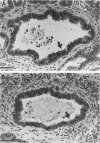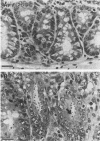Abstract
Three groups of congenitally athymic nude mice were persistently infected following oral administration of 2 x 10(7) Cryptosporidium parvum oocysts. Two groups were treated once daily for 10 days with either neutralizing monoclonal antibody (MAb) 17.41 or an isotype control MAb. The third group received no treatment. Intestinal-infection scores were significantly decreased in nude mice treated with MAb 17.41 compared with isotype control MAb-treated and nontreated control groups (P less than 0.005). Biliary and pancreatic cryptosporidial-infection scores were similar for the MAb 17.41-treated and isotype control MAb-treated groups (P greater than 0.05).
Full text
PDF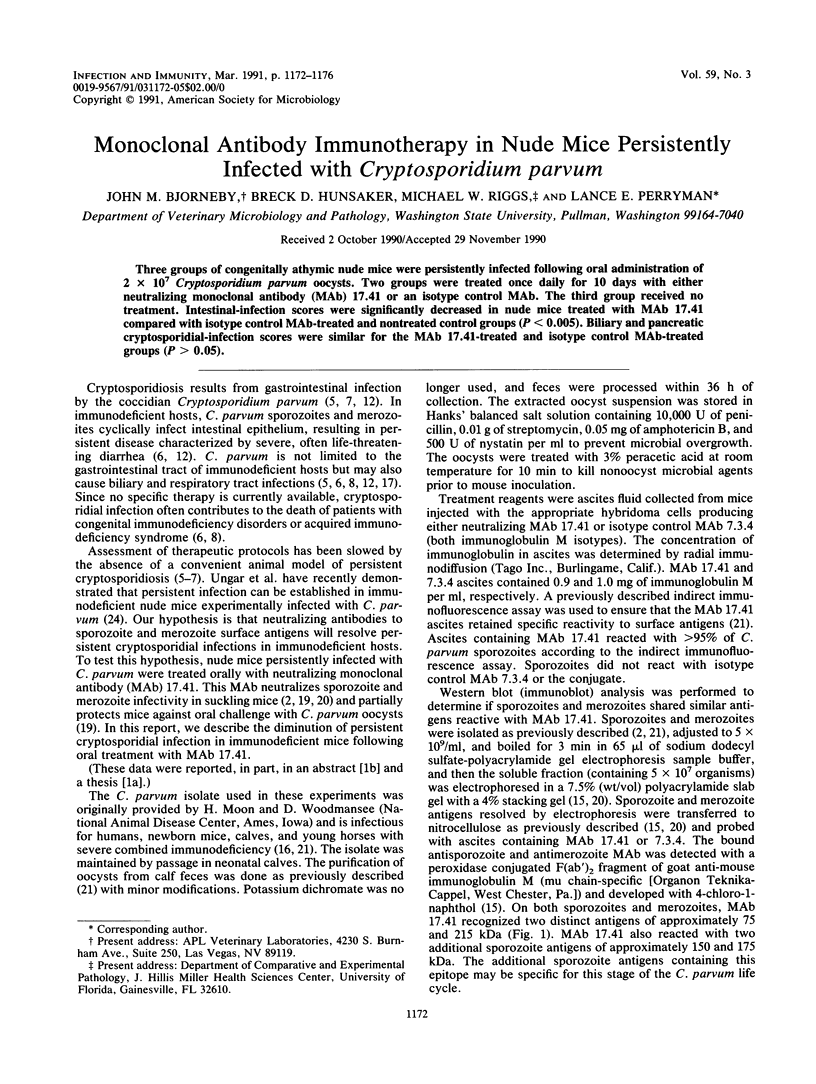
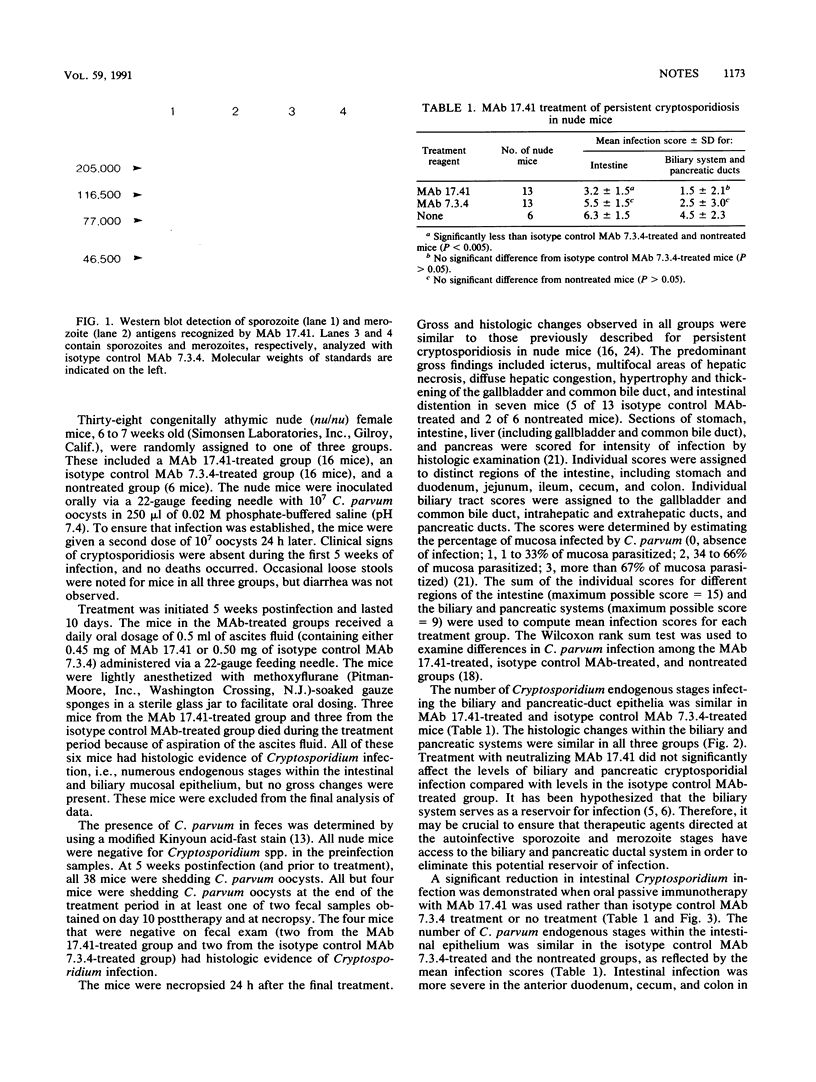
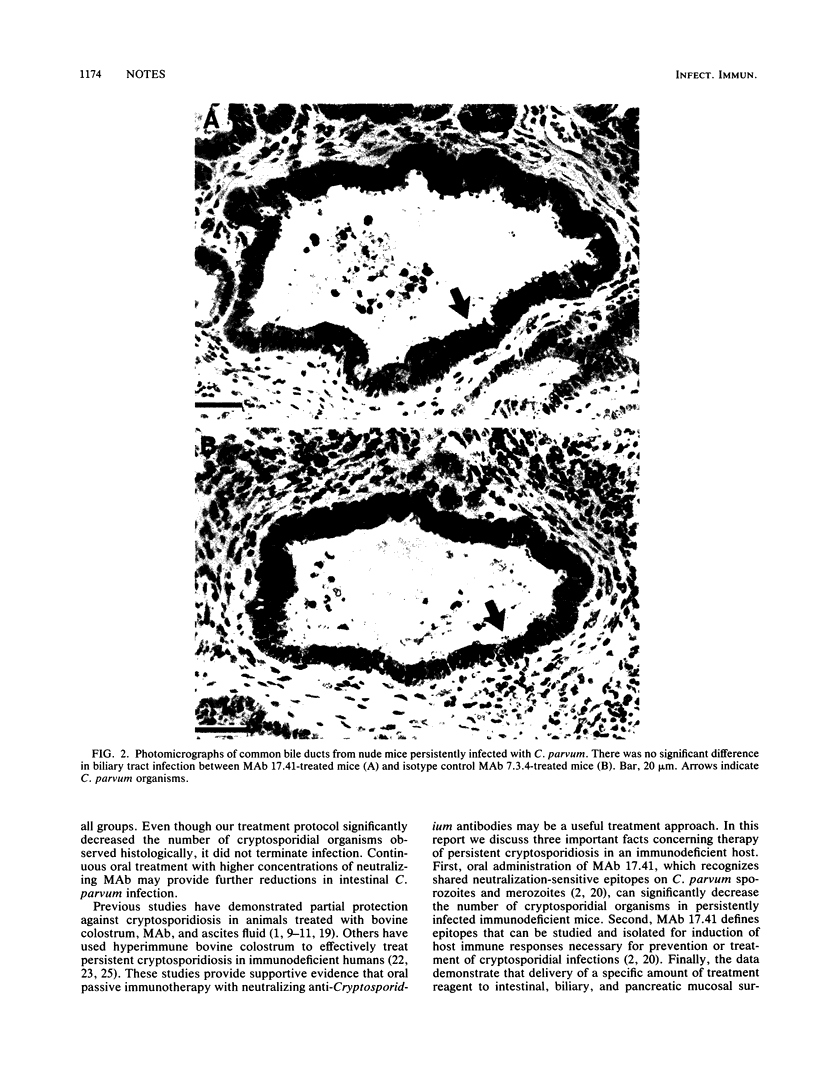
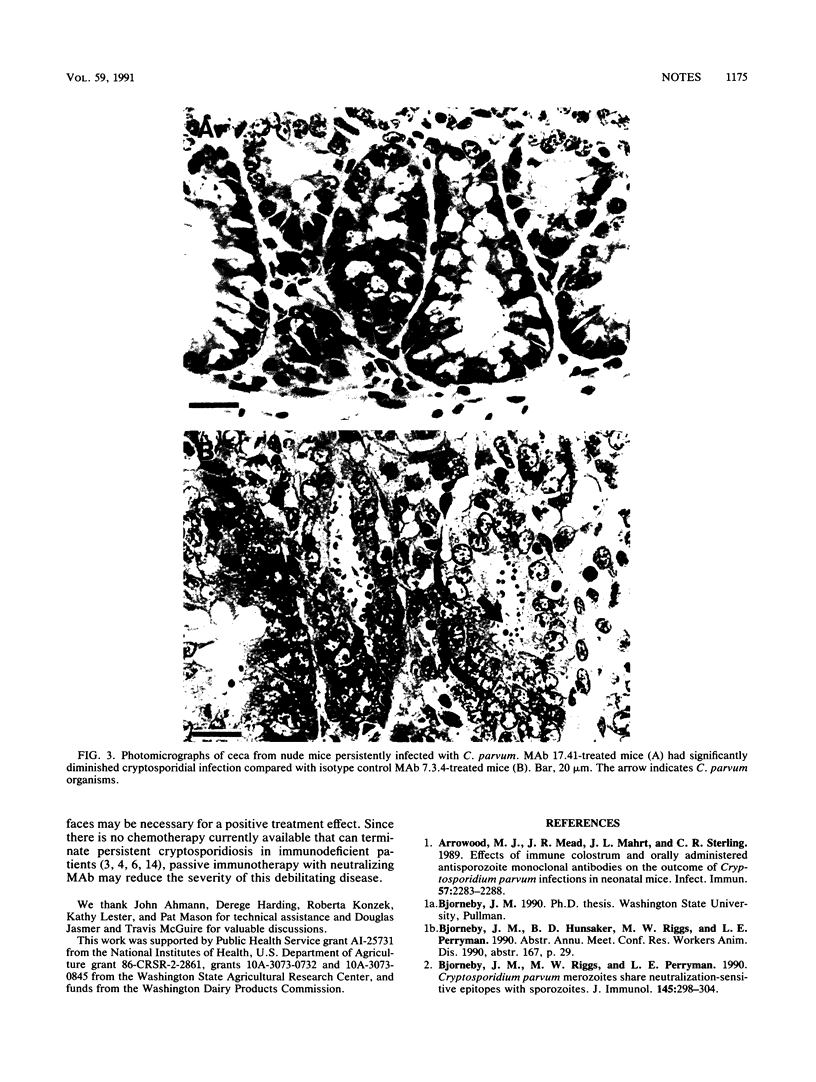
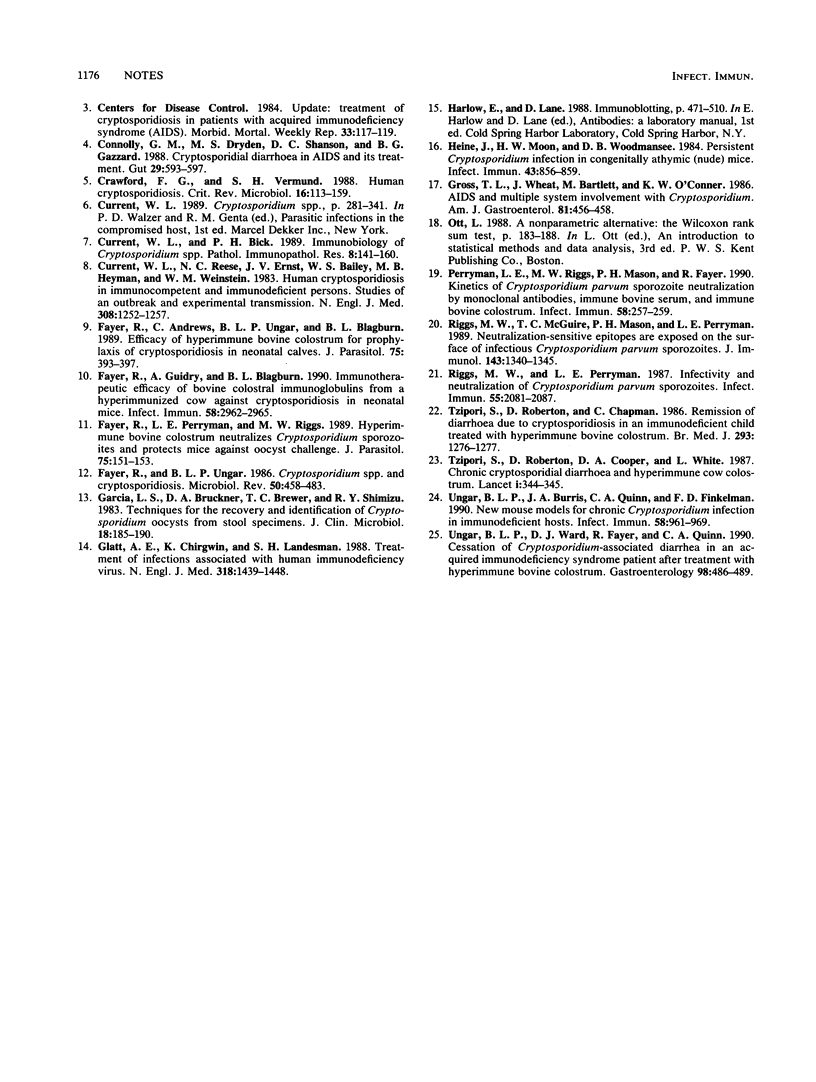
Images in this article
Selected References
These references are in PubMed. This may not be the complete list of references from this article.
- Arrowood M. J., Mead J. R., Mahrt J. L., Sterling C. R. Effects of immune colostrum and orally administered antisporozoite monoclonal antibodies on the outcome of Cryptosporidium parvum infections in neonatal mice. Infect Immun. 1989 Aug;57(8):2283–2288. doi: 10.1128/iai.57.8.2283-2288.1989. [DOI] [PMC free article] [PubMed] [Google Scholar]
- Bjorneby J. M., Riggs M. W., Perryman L. E. Cryptosporidium parvum merozoites share neutralization-sensitive epitopes with sporozoites. J Immunol. 1990 Jul 1;145(1):298–304. [PubMed] [Google Scholar]
- Connolly G. M., Dryden M. S., Shanson D. C., Gazzard B. G. Cryptosporidial diarrhoea in AIDS and its treatment. Gut. 1988 May;29(5):593–597. doi: 10.1136/gut.29.5.593. [DOI] [PMC free article] [PubMed] [Google Scholar]
- Crawford F. G., Vermund S. H. Human cryptosporidiosis. Crit Rev Microbiol. 1988;16(2):113–159. doi: 10.3109/10408418809104469. [DOI] [PubMed] [Google Scholar]
- Current W. L., Bick P. H. Immunobiology of Cryptosporidium spp. Pathol Immunopathol Res. 1989;8(3-4):141–160. doi: 10.1159/000157146. [DOI] [PubMed] [Google Scholar]
- Current W. L., Reese N. C., Ernst J. V., Bailey W. S., Heyman M. B., Weinstein W. M. Human cryptosporidiosis in immunocompetent and immunodeficient persons. Studies of an outbreak and experimental transmission. N Engl J Med. 1983 May 26;308(21):1252–1257. doi: 10.1056/NEJM198305263082102. [DOI] [PubMed] [Google Scholar]
- Fayer R., Andrews C., Ungar B. L., Blagburn B. Efficacy of hyperimmune bovine colostrum for prophylaxis of cryptosporidiosis in neonatal calves. J Parasitol. 1989 Jun;75(3):393–397. [PubMed] [Google Scholar]
- Fayer R., Guidry A., Blagburn B. L. Immunotherapeutic efficacy of bovine colostral immunoglobulins from a hyperimmunized cow against cryptosporidiosis in neonatal mice. Infect Immun. 1990 Sep;58(9):2962–2965. doi: 10.1128/iai.58.9.2962-2965.1990. [DOI] [PMC free article] [PubMed] [Google Scholar]
- Fayer R., Perryman L. E., Riggs M. W. Hyperimmune bovine colostrum neutralizes Cryptosporidium sporozoites and protects mice against oocyst challenge. J Parasitol. 1989 Feb;75(1):151–153. [PubMed] [Google Scholar]
- Fayer R., Ungar B. L. Cryptosporidium spp. and cryptosporidiosis. Microbiol Rev. 1986 Dec;50(4):458–483. doi: 10.1128/mr.50.4.458-483.1986. [DOI] [PMC free article] [PubMed] [Google Scholar]
- Garcia L. S., Bruckner D. A., Brewer T. C., Shimizu R. Y. Techniques for the recovery and identification of Cryptosporidium oocysts from stool specimens. J Clin Microbiol. 1983 Jul;18(1):185–190. doi: 10.1128/jcm.18.1.185-190.1983. [DOI] [PMC free article] [PubMed] [Google Scholar]
- Glatt A. E., Chirgwin K., Landesman S. H. Current concepts. Treatment of infections associated with human immunodeficiency virus. N Engl J Med. 1988 Jun 2;318(22):1439–1448. doi: 10.1056/NEJM198806023182206. [DOI] [PubMed] [Google Scholar]
- Gross T. L., Wheat J., Bartlett M., O'Connor K. W. AIDS and multiple system involvement with cryptosporidium. Am J Gastroenterol. 1986 Jun;81(6):456–458. [PubMed] [Google Scholar]
- Heine J., Moon H. W., Woodmansee D. B. Persistent Cryptosporidium infection in congenitally athymic (nude) mice. Infect Immun. 1984 Mar;43(3):856–859. doi: 10.1128/iai.43.3.856-859.1984. [DOI] [PMC free article] [PubMed] [Google Scholar]
- Perryman L. E., Riggs M. W., Mason P. H., Fayer R. Kinetics of Cryptosporidium parvum sporozoite neutralization by monoclonal antibodies, immune bovine serum, and immune bovine colostrum. Infect Immun. 1990 Jan;58(1):257–259. doi: 10.1128/iai.58.1.257-259.1990. [DOI] [PMC free article] [PubMed] [Google Scholar]
- Riggs M. W., McGuire T. C., Mason P. H., Perryman L. E. Neutralization-sensitive epitopes are exposed on the surface of infectious Cryptosporidium parvum sporozoites. J Immunol. 1989 Aug 15;143(4):1340–1345. [PubMed] [Google Scholar]
- Riggs M. W., Perryman L. E. Infectivity and neutralization of Cryptosporidium parvum sporozoites. Infect Immun. 1987 Sep;55(9):2081–2087. doi: 10.1128/iai.55.9.2081-2087.1987. [DOI] [PMC free article] [PubMed] [Google Scholar]
- Tzipori S., Roberton D., Chapman C. Remission of diarrhoea due to cryptosporidiosis in an immunodeficient child treated with hyperimmune bovine colostrum. Br Med J (Clin Res Ed) 1986 Nov 15;293(6557):1276–1277. doi: 10.1136/bmj.293.6557.1276. [DOI] [PMC free article] [PubMed] [Google Scholar]
- Tzipori S., Roberton D., Cooper D. A., White L. Chronic cryptosporidial diarrhoea and hyperimmune cow colostrum. Lancet. 1987 Aug 8;2(8554):344–345. doi: 10.1016/s0140-6736(87)90944-5. [DOI] [PubMed] [Google Scholar]
- Ungar B. L., Burris J. A., Quinn C. A., Finkelman F. D. New mouse models for chronic Cryptosporidium infection in immunodeficient hosts. Infect Immun. 1990 Apr;58(4):961–969. doi: 10.1128/iai.58.4.961-969.1990. [DOI] [PMC free article] [PubMed] [Google Scholar]
- Ungar B. L., Ward D. J., Fayer R., Quinn C. A. Cessation of Cryptosporidium-associated diarrhea in an acquired immunodeficiency syndrome patient after treatment with hyperimmune bovine colostrum. Gastroenterology. 1990 Feb;98(2):486–489. doi: 10.1016/0016-5085(90)90842-o. [DOI] [PubMed] [Google Scholar]




